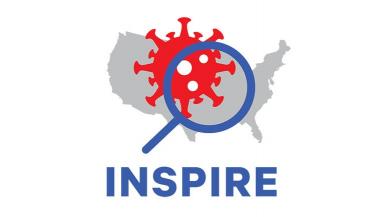COVID-19 has wreaked havoc around the globe, causing nearly 2 million deaths worldwide, including more than 380,000 fatalities in the United States alone. While much has been learned about the disease in the year since it was first detected, its long-term effects on the health of COVID-19 survivors may take years to understand. A major effort to gain that understanding is about to begin, as Rush University Medical Center and partners across the country launch a nationwide study of patients who have been infected with the COVID-19 virus.
INSPIRE (Innovative Support for Patients with SARS COV-2 Infections Registry) is a federal Centers for Disease Control and Prevention-funded project led by Rush, along with the University of Washington, Yale New Haven Health and a trans-continental team that includes the University of Texas Health Science Center at Houston (aka UTHealth), the University of Texas Southwestern Medical Center (UT Southwestern), UCLA, the University of California, San Francisco and Thomas Jefferson University. The study will track 3,600 individuals with new COVID-19 symptoms and diagnosed within the preceding four weeks and 1,200 people without COVID-19 to assess the long-term outcomes of infections with SARS CoV-2, the virus that causes COVID-19, on various age groups over a two-year period.
With a philosophy that views study participants as part of the team — ensuring patient involvement, engagement and control over their data — researchers will look closely at COVID-19 survivors’ health care utilization, ongoing clinical events, and physical and mental function, including neurocognitive function and fatigue.
INSPIRE participants will register using the Hugo platform, a health data system that leverages individuals’ legal right to access to their own health information and collects health data on their behalf while maintaining the highest degree of confidentiality. This arrangement will allow essential, large-scale data gathering.
“This disease will be with us for years to come, and understanding the impact on the health of survivors will be essential to our understanding of how to treat it,” said Dr. Bala Hota, chief analytics officer at Rush and an infectious disease expert. “This work will provide the foundation for our long-term understanding of the ongoing impact of COVID-19.”
“These insights are crucial for understanding the complexities of these impacts so that we can improve the quality of clinical care for our patients,” added Dr. Joann Elmore, principal investigator at the UCLA site, professor of medicine in the Department of Medicine at the David Geffen School of Medicine and professor of health policy and management at the Fielding School of Public Health.
New Rush clinic focuses on post-COVID care
The study coincides with Rush’s launch of a new post-COVID care clinic at the Medical Center. The clinic’s patients work closely with a patient navigator who will help coordinate care and connect them with a team of expert providers who will help patients find their way through the many unknowns of life after COVID-19.
“What is both surprising and highly unpredictable is determining who will have long-lasting effects from COVID-19 and what types of symptoms they will continue to have long after they no longer have the disease itself,” said Dr. Monnie Wasse, director of the post-COVID clinic and vice chairperson and director of interventional nephrology in the Medical Center’s Department of Internal Medicine. “Right now, that is a key question we are asking ourselves as health care professionals. Between our clinic and this research, we will be advancing our knowledge rapidly.”
Enrollment and recruitment for INSPIRE is now underway. To enroll, please visit the INSPIRE website. Information will be gathered through ongoing surveys and will not require participants to see a doctor.




